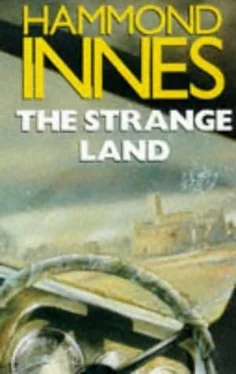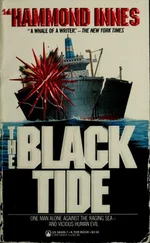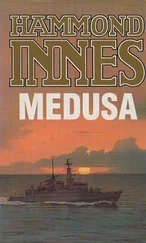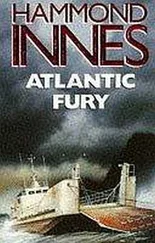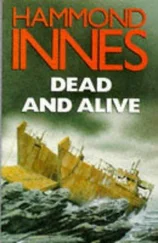Hammond Innes - The Strange Land
Здесь есть возможность читать онлайн «Hammond Innes - The Strange Land» весь текст электронной книги совершенно бесплатно (целиком полную версию без сокращений). В некоторых случаях можно слушать аудио, скачать через торрент в формате fb2 и присутствует краткое содержание. Жанр: Прочие приключения, на английском языке. Описание произведения, (предисловие) а так же отзывы посетителей доступны на портале библиотеки ЛибКат.
- Название:The Strange Land
- Автор:
- Жанр:
- Год:неизвестен
- ISBN:нет данных
- Рейтинг книги:4 / 5. Голосов: 1
-
Избранное:Добавить в избранное
- Отзывы:
-
Ваша оценка:
- 80
- 1
- 2
- 3
- 4
- 5
The Strange Land: краткое содержание, описание и аннотация
Предлагаем к чтению аннотацию, описание, краткое содержание или предисловие (зависит от того, что написал сам автор книги «The Strange Land»). Если вы не нашли необходимую информацию о книге — напишите в комментариях, мы постараемся отыскать её.
The Strange Land — читать онлайн бесплатно полную книгу (весь текст) целиком
Ниже представлен текст книги, разбитый по страницам. Система сохранения места последней прочитанной страницы, позволяет с удобством читать онлайн бесплатно книгу «The Strange Land», без необходимости каждый раз заново искать на чём Вы остановились. Поставьте закладку, и сможете в любой момент перейти на страницу, на которой закончили чтение.
Интервал:
Закладка:
It had been in the spring of 1934, at the very end of the pacification. The tribes of the district of Foum-Skhira were particularly warlike. Their resistance under Caid Hassan had been stubborn and the fighting had dragged on. Marcel Duprez, then a lieutenant, was among the French forces. He had been an officer of the AI in Algeria and four years before he had come in alone from the desert to prepare the way for the pacification and persuade the tribes that resistance would be pointless. He knew them all. One afternoon, when both sides had withdrawn after a day of particularly savage fighting, he had calmly walked out into the no man’s land between the two forces, accompanied by two Legionnaires. They were unarmed and all they carried was the paraphernalia for making tea.
He had set his brazier down midway between the two forces and, after quietly performing the ceremony of the making of the tea, had called upon Hassan and his chiefs to come and drink it with him. And they had come, knowing the officer and admiring his bravery. And over the tea table he had persuaded the Caid and his chiefs that the French must win in the end and that there was no point in continuing the fight. He had then talked about their history and, in particular, the history of the ruined city. As the sun was setting, terms were agreed, but for the sake of his young warriors’ pride Caid Hassan had insisted on continuing the battle for one more day, though it was decided that the fighting should not be pressed by either side. Duprez had then gone back to the Legion’s lines and all next day the two forces fired on each other with a great deal of noise, but little loss of life. And in the evening Hassan had come to capitulate.
‘You were taken to the tent of the general commanding the Legionnaires,’ Jan added. ‘But you refused to surrender to him. You said you would only surrender to the officer who had come out and served tea to you. They told you that Marcel Duprez had been wounded in the day’s fighting. When you heard this, you insisted on being taken to the hospital tent where he lay, and there, with the general looking on, you surrendered to Lieutenant Duprez.’ Jan stopped there and stared at the Caid. ‘That is how Marcel told it to me. It was because of his interest in the place and his plans that you gave him Kasbah Foum. Also, he loved your people.’
The Caid glanced up at his son. ‘Well, Ali, is that correct?’ he asked.
Ail said nothing. His face was impassive, but his eyes glinted angrily in the flickering light.
‘Say whether it is correct or not,’ the Caid said, and there was an edge to his voice.
‘It proves nothing,’ Ali answered. ‘Legard or the Commandant at Agdz could have told the story to him.’
‘And all the other things he has told me?’ The Caid stared up at his son and I was conscious again of the tension between them. Then he held out his hand to Jan. ‘Give me the letter Capitaine Duprez wrote.’
Jan handed him the letter. Lights were brought and placed at the Caid’s feet and, whilst he bent forward to read the letter, our glasses were refilled for the third time. The Caid held the letter in such a way that his son. leaning down over his shoulder, could not read it, and when he had finished it, he folded it up and slipped it inside his djellaba. ‘This is not a simple matter,’ he said, speaking slowly in French. ‘There is an old belief that silver was once mined at Kasbah Foum and that belief has been revived because of this American. I had hoped that it would be Capitaine Duprez who developed that place. He would have used it for the benefit of the people here. He had plans for hospitals and schools. I had hoped that perhaps I was giving him the means to make those plans come to life. But now he is dead and you are here in his place. How do I know I can trust you?’
Jan’s eyes were steady as they met the old man’s gaze. ‘I have come to live here,’ he said quietly. ‘Morocco is my home now. I have no home anywhere else in the world.’ He leaned forward slightly, a note of earnestness in his voice. ‘If there is wealth at Kasbah Foum, it shall be developed for the benefit of the people here. That is what I promised Marcel, and I shall keep my promise.’
He had spoken seriously and with force. The old man nodded. But he was still uncertain. ‘You are not a Frenchman,’ he said. ‘And you have only recently arrived in Morocco.’ He hesitated and then added, ‘What you say may be the truth at this moment. But a man easily changes his mind when his roots are not deep in the soil of his promise.’
‘I have come to live here,’ Jan repeated. ‘Morocco is my country now.’
The Caid glanced up at his son and then stared at Jan. It was as though he were weighing up the two men in his mind. There was a long silence. Finally he said, ‘Allah be my guide in this. It shall be as Capitaine Duprez wished it. I will give you — ‘
‘No.’ All’s hand descended on his father’s shoulder, gripping hold of it, digging his powerful fingers into the old flesh. ‘These men are strangers. They want the silver. Nothing more. They do not love our people.’
‘I do not believe it,’ the old man said, trying vainly to pluck his son’s hand from his shoulder.
‘Do this thing,’ Ali said, ‘and, as Allah is my witness, there will be trouble among the people.’
I stared at the scene with a sense of shock, scarcely able to believe that this was a son speaking to his father. In strict Berber etiquette the man should be as a child in the presence of his father, even to the point of making a request through an intermediary. Yet Ali’s manner was openly hostile, even contemptuous. The others in the room had noticed it, too. They were whispering and muttering among themselves whilst the two men — father and son — stared at each other. They were like two adversaries who had battled a long time. Finally the Caid gave a little sigh and his eyes, as they turned away, had the vacancy of the very old; it was as though they looked beyond the flickering walls, back through the dim vistas of the past. Slowly he pulled himself to his feet. Ali made no move to help him. His face was cruel with the look of satisfaction. ‘My father is tired,’ he said in French. ‘I must ask you to leave and permit him to rest.’
We waited for the Caid to speak. He stood there a long time, staring into vacancy. And all he said in the end was, ‘Yes, I am tired now. We will talk of this some other day.’
Jan-started to say something, but Ali silenced him with a gesture. He took his father’s arm and led him out. The Caid did not protest. But he paused in the doorway and looked back. His eyes fastened on Jan. And suddenly they weren’t vacant any more. They were intensely alive as though he were examining Jan’s features for a sign by which he could come to a decision. ‘Barak allaho fik!’ he murmured. ‘Allah bless you!’ His voice was gentle, like a monk saying a benediction. And then he was gone.
They brought lights and escorted us down the narrow stairs, across the open space of the roof top and into the bowels of the kasbah. A hand gripped my arm in the half dark. ‘I don’t like it,’ Jan whispered. ‘Ali is in control here.’
His words echoed my thoughts. We were in the dark tunnel of the entrance passage now. It was intensely cold and I tried to convince myself that that was why I was trembling. We passed the rectangular gap lit by the red glow of the brazier. Figures were huddled around it, as they had been when we arrived. They did not seem to have moved. It was just a brief glimpse and then the carbide flames were flickering on blank walls again, silhouetting the cowled, shadowy figures round us.
With a sense of relief I heard the scrape of the securing bar, the creak of the heavy wooden door. There was a rush of fresh air, a murmur of polite farewells, and then we were out in the cold, bright glitter of the star-studded night.
Читать дальшеИнтервал:
Закладка:
Похожие книги на «The Strange Land»
Представляем Вашему вниманию похожие книги на «The Strange Land» списком для выбора. Мы отобрали схожую по названию и смыслу литературу в надежде предоставить читателям больше вариантов отыскать новые, интересные, ещё непрочитанные произведения.
Обсуждение, отзывы о книге «The Strange Land» и просто собственные мнения читателей. Оставьте ваши комментарии, напишите, что Вы думаете о произведении, его смысле или главных героях. Укажите что конкретно понравилось, а что нет, и почему Вы так считаете.
